
Sydney Rows
A Centennial History of the Sydney Rowing Club, 1970, by A L May
Table of Contents
Chapters
- Preliminaries: before 1870
- Foundations: 1870-1880
- New Clubs: 1880-1890
- The Amateur Question: 1890-1900
- Sydney on Top: 1900-1910
- Henley and War: 1910-1920
- Pearce and Mosman: 1920-1930
- Financial Problems: 1930-1940
- War and Wood: 1940-1950
- Strength and Stability: 1950-1960
- On Top Again: 1960-1970
Appendices
10. Strength and Stability: 1950-1960
Thirteen regattas were set down for the relatively quiet 1952/53 season. A feature for Sydney was the winning of the champion fours of NSW for the first time for many years, the crew being Andrews (bow), John Rodgers, Bill Rodgers, Chapman (stroke) and Gordon Parry (cox). Sydney was beaten by 1/2 length by Haberfield in the 2000 metre champion eights and, although they won at the last-ever Anniversary Day regatta, finished only fourth in the 3-miler. Leichhardt beat Mosman by a length to take the title while there was a new sculling champion: with Wood a non-starter, Peter Evatt of Leichhardt, son of the Federal Opposition leader, Dr. H. V. Evatt, beat George Neilson of Balmain for the title. Barry Green successfully defended his lightweight sculling title, while Sydney finished second to Leichhardt in the lightweight fours championship.
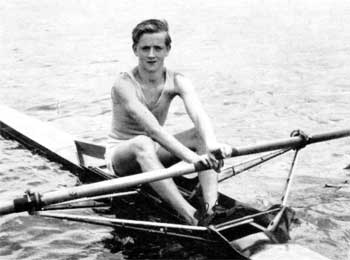
Barry Green
Wood and Riley had earlier won the champion double sculls. Gould was selector once again and he successfully nominated himself as State coach. He included four Leichhardt men in his crew along with three from Mosman and Browne of Sydney. Palmer and Chapman were chosen as emergencies.
The King's Cup was held in Perth, with two new events being added to the programme: a champion coxed pair and a champion double sculls. The result of the main event was the same as the year before: Victoria first and NSW second, the margin being 1 1/2 lengths. WA was 6 lengths back third. NSW remained on top in the sculls, with Evatt beating Rawlins by 8 lengths in the President's Cup. Chapman and Palmer won the pairs, but only by a length from Tasmania, while WA rowed over in the double sculls.
There was international interest once again in the 1953/54 season, with the British Empire Games due to be held in Vancouver in July, 1954. It was Sydney's turn again in senior rowing. Nim Greenwood's transfer and Phil Cayzer's return strengthened Sydney and a string of wins resulted, including the champion 2000 metres and 3 mile events. The crew for the latter title was Bill Rodgers (bow), Mahoney, Browne, John Rodgers, Palmer, Greenwood, Hobbs, Cayzer (stroke) and Parry (cox). The senior pair of Sam Hobbs, the Englishman, and Greenwood also had a series of fine wins.
A strong Sydney contingent invaded Melbourne for the 1953 Henley, but Riley in the sculls was the only victory. The senior eight finished second to Mercantile in the final of the Grand while the maiden eight was also second to Mercantile in the Founders' Cup final. The latter crew was boated Don Sutherland (bow), W. Kelly, J. Davis, Col Crawford, John Webster, Bruce Cumming, Des Dalton, Ross Miller (stroke) and Neil McCallum (cox). The pair also finished second, this time to Albert Park.
A feature of the season's rowing was the visit to Sydney of a four and a sculler from the West End Rowing Club of Auckland. Don Rowlands, the sculler, beat Evatt in the 2000 metre sculls with Wood, back in his single, finishing third. The four took out the champion fours of NSW, Sydney finishing some 3 lengths back second. A further feature was the closeness of the pointscores. Sydney finally won the premiership from Leichhardt by 191 1/2 to 191, while Leichhardt beat Sydney in the junior pennant by 70 to 69.
SRC crews rowed in a new type of singlet from the 1953/54 season: a woollen athletic replaced the short-sleeved singlet adopted in 1936. (No further change took place till 1967/68, when the club crest was added over the left breast.)
The coach of the winning eight in the championship automatically became State selector and coach in 1954. The honour fell to Jack Goulding, his crew beating Leichhardt by 4 lengths with University well back third. He chose seven Sydney men - Browne, Chapman, Palmer, John Rodgers, Greenwood, Cayzer and Parry (cox), along with Anderson and Williamson. Mahoney and Bill Rodgers were emergencies and were entered in the pair-oar.
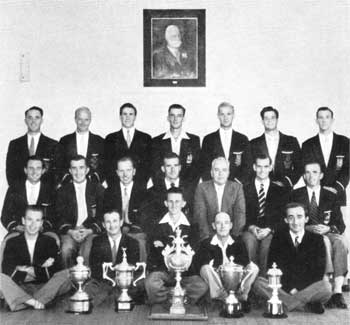
Deloitte looks down on the successful senior oarsmen of 1953-54
Hobart again turned on quite foul weather for the big regatta. Conditions were, however, very fast, and Victoria won the event for the third time in a row in the race record time of 14.14. NSW was second, 1 1/2 lengths back, with Queensland close up third. Gerry Hubbard of WA, a lightweight, won the sculls from Barry Green, rowing for Queensland, with Evatt only third. The NSW pair beat Tasmania, the only other competitor, by 1 1/2 lengths.
Test races for the Empire Games were held early in 1954. Evatt won the single sculls, Wood and Riley the doubles, and Anderson and Williamson the pair-oar. It was later decided to also boat a four from the small boat men, and the experiment proved very successful. The crew of Wood (bow), Evatt, Williamson, Anderson (stroke) and Lionel Robberds (cox) won their heat at the Games, beating the NZ West End four, and they repeated the performance in the final, winning by 2 lengths with England a close up third.
Evatt sculled poorly and failed to qualify for the final which was won by Rowlands of NZ. Wood and Riley had a comfortable win in the double sculls, while the Australian pair finished third in the final of their event. Canada surprised by beating England quite well in the final of the eights.
The 1954/55 season was a great one for Sydney Rowing Club, with clear wins recorded in both pointscore competitions. The club dominated the senior eights in the first half, culminating in a 3/4 length win over Leichhardt in the 2000 metre championship at Sydney's own regatta. The winning crew was Andrews (bow), Browne, Webster, Cumming, Palmer, John Rodgers, Bill Rodgers and Mahoney (stroke). The crew of Webster, Browne, Palmer and Mahoney also collected the champion fours of NSW.
A string of wins was recorded by the club's maiden eight and it competed at Henley-on-Yarra, but, once again, was beaten by Mercantile in the final of the Founders' Cup. Merv Wood also contributed a substantial number of points, especially when he won the 2000 metre championship over Gordon Lawson, a Singleton sculler rowing with Sydney, and Peter Evatt. Sydney's eight started a firm favourite for the State championships, but the race was won by 2 lengths by Leichhardt. The event was rowed on the flooded Nepean which was flowing strongly, and a record-shattering time of 13.30 was recorded. In the sculls, Wood was successful again, while Sydney performed the rare feat of finishing first, second and third in the junior fours.
Success continued to flow Sydney's way in the remaining regattas: Wood and Riley won the champion double sculls by 30 lengths; the champion junior eights was won by the crew of Don Sutherland (bow), Jim Woodcock, John Burton, Bob Clark, Fred Benfield, Peter Goldman, Des Dalton, George Elmslie (stroke) and Bill Wiggins (cox); and a scratch eight which included Merv Wood won the Gold Cup. The last win was particularly satisfying as, a year before, the club had been first past the post in the Gold Cup and had been disqualified.
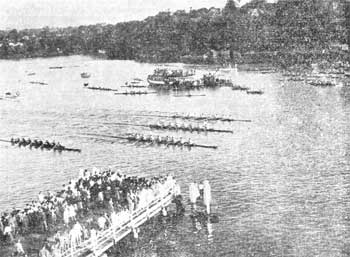
Sydney wins the 1955 Gold Cup narrowly from King's and Shore
The Association reverted to the former system for the 1955 King's Cup and Gould was appointed sole selector again. The crew finally selected contained five Leichhardt men - Evatt, Asimus, Williamson and Anderson plus a new-comer - Stuart Mackenzie, 6' 3" and 14 stone, who had rowed in the King's eight only a year before. Bill Andrews and John Rodgers gained selection, along with Kennaway of University, while Bill Rodgers and Dick Browne were chosen as emergencies and the pair oar. Jack Goulding defeated Professor Frank Cotton in the ballot for coach.
Port Adelaide was the site of the big events in 1955. Victoria led throughout the race until, with only 1/4 mile to go, WA put on a tremendous burst and passed them, going away to win by 2 1/2 lengths. NSW finished third, 3 lengths behind Victoria. Wood regained the sculling title for NSW with a 6 length win over Barry Green who beat Hubbard, the title holder, for second place. In the pair-oar championship of Australia, Victoria beat NSW by 2 1/2 lengths with Tasmania the only other starter.
With the Olympic Games due to be held in Melbourne in November, 1956, the 1955/56 season was of particular significance. It also proved a very eventful one for Sydney's senior oarsmen. The King's Cup was to double as the Olympic test race and the NSWRA devised an elaborate procedure to select the State eight. The coaches of the first three crews in the State championship in December were to select, in order, trial crews and these were to race in February with the winning coach becoming State selector and coach. All races, including the King's Cup, were to be over 2000 metres, the Olympic distance.
Three senior eights appeared on the water - Leichhardt and two Sydney crews - and Leichhardt proved too good in the opening regattas. Some of the SRC senior oarsmen became unhappy with the club's selection and coaching and, about a month before the championships, eight of the sixteen requested and were reluctantly granted transfers to Mosman. The "rebels" went on to win the State title by a canvas from the hurriedly reassembled Sydney crew in a most exciting "grudge" race. Leichhardt was 3/4 length back third.
The three coaches concerned, Cayzer, Chapman and Evatt, proceeded to select their eights for the additional trial. Webster and Dalrymple of Sydney were chosen in the first crew and Crawford, Nassar, Thysse, Dalton and James in the second. In a shock result, however, the number 3 crew, stroked by Evatt himself, won by a length from the number 1 crew. At the same regatta, Wood retained his sculling title by beating Mackenzie by 2 1/2 lengths.
Success for Sydney at other regattas in the season was mainly confined to Wood and Riley in the double sculls (including the championship) and to a keen group of maiden oarsmen. Four of this group, Ron Wood, Barry May, John McHugh and Bruce McPherson, each had five wins. Barry Green also returned to Sydney during the season and won the lightweight sculling championship once again.
The King's Cup was set down for Lake Wendouree in May, 1956. Evatt, the NSW selector and coach, again selected himself in the stroke seat of his crew. He chose three "rebels", Rodgers, Cumming and Benfield, three other Leichhardt men, Currall, Williamson and Anderson, and Eder of Haberfield, with Robberds of Leichhardt cox. Heats and a repechage were held in the King's Cup to approximate Olympic conditions. NSW had an easy win over SA in its heat, while WA and Victoria also won. Queensland won the repechage to enter the final. In the big race itself, NSW hit the front at the 1750 metre mark but Victoria staged a finishing sprint which NSW could not match and went on to win by 3/4 length. Queensland was 3 lengths back third.
NSW nominated both Wood and Mackenzie for the President's Cup (taking advantage of the AARC's decision to permit this for 1956). Both won their heats and they were joined in the final by Squires of Tasmania and Hubbard of WA. In the final, Mackenzie moved ahead of Wood at the half way and went on to win by 3 1/2 lengths with Squires finishing third, 3 lengths behind Wood. Bob Aitken, 33-year-old coach of the Victorian crew, invited Benfield and Currall to join selection trials for the Australian eight and Benfield succeeded in ultimately gaining selection.
Olympic trials for other classes of boats Were held on Lake Wendouree and at Penrith in October, 1956, with NSW being represented solely by club crews. The coxless four test race was won by a canvas by the Leichhardt four of Harrison, Evatt, Williamson and Anderson, while Wood and Riley were successful in the double sculls. Maurie Grace and Peter Raper won the coxless pairs, while the coxed fours and coxed pairs went to Victorian crews.
The successful staging of the Olympic regatta was a great triumph for Australian rowing officials. An Olympic Rowing Committee, with five members from Victoria and one from each other State, was formed in 1953 and it met regularly to plan course requirements, the housing of boats and the conduct of the regatta. All the many difficulties - including a temporary switch from Lake Wendouree to Lake Learmonth, 14 miles from Ballarat - were overcome, and an excellent regatta resulted.
The races were held from 23-27 November, with 72 crews taking part from 25 nations. Australia was represented in all seven events, and no less than five crews made the finals.
The eight put up a tremendous performance to win the first heat from Canada, USA and Great Britain in the fastest heat time of 6.05.8. Czechoslovakia won the second heat from Japan and France while Sweden beat USSR by 0.1 seconds in the final heat with Italy third. The USA and Italy entered the semi-finals through the repechage. In the first semi-final, only feet separated Australia and USA over the full course, with the Americans winning by 0.5 seconds. The second semi-final was won easily by Canada with Sweden second. The final was another very fine race, with USA adding to its great Olympic eight record by beating Canada by 1.9 seconds with Australia 2.1 seconds back third.
Mackenzie was beaten by Ivanov of Russia in his heat and by Kelly of USA in the semi-final but qualified for the final. In the big event, he led from the start but was unable to withstand the great finishing effort from Ivanov which took the Russian from fourth at the 1500 metres mark to a win by 5 seconds. Kelly was third.
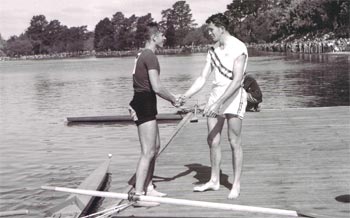
Mackenzie congratulates Ivanov after finishing second
Australia gained its third medal in the double sculls. Wood and Riley finished only third in their heat but won the repechage and, in the final, took the bronze medal behind USSR and USA.
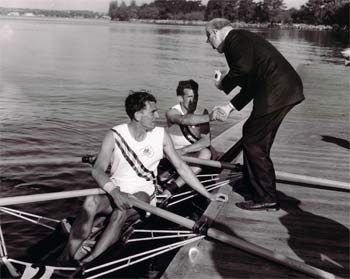
Wood and Riley receive their bronze medals from Avery Brundage
The Australian coxed four and coxless pair both finished fourth in their finals, while the coxed pair and coxless fours were eliminated in the semi-finals. Both pair-oar events were won by the USA, while Italy won the coxed fours and Canada the coxless fours.
